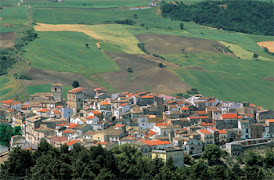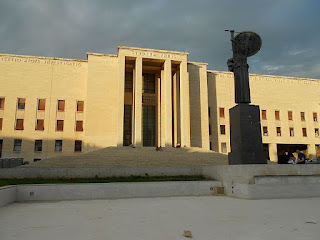Lawyer who led Italy despite having no political experience
Former Prime Minister of Italy Giuseppe Conte was born on this day in 1964 in the town of Volturara Appula in the province of Foggia in Puglia..jpg)
Giuseppe Conte was head of the Italian
government between 2018 and 2021
Conte served as Italian Prime Minister between 2018 and 2021, becoming the longest serving politically non-affiliated prime minister in the history of Italy.
He was Italy's fifth technocrat prime minister - defined as being appointed without any previous political experience - and the first from southern Italy since Ciriaco De Mita in 1989.
A law professor for a large part of his career, Conte is often referred to as ‘the people’s lawyer’ (l’avvocato del popolo), as this is how he described himself during his first speech as Prime Minister. He is now the president of the Italian political party Movimento Cinque Stelle - the Five Star Movement.
Conte’s father, Nicola, was an employee of the local authority, and his mother, Lillina, was a school teacher. After the family moved to San Giovanni Rotondo, another town in the province of Foggia, Conte attended the nearby liceo classico and then went to study at the Sapienza University of Rome. To this day he remains an avid AS Roma fan, having started to support the club while at university.
After qualifying formally as a lawyer, Conte went to study abroad and later either researched or lectured at several universities. He is currently professor of private law at the University of Florence and sits on the board of trustees of John Cabot University in Rome.
When the 2018 Italian general election resulted in a hung parliament, Conte was proposed as the independent leader of a government that was a coalition between the Movimento Cinque Stelle (M5S) and La Lega (formerly known as Lega Nord), despite never having held any political position before. He was sworn in as prime minister on 1 June 2018 by Italian President Sergio Mattarella.
.jpg) |
| Giuseppe Conte (left) and president Sergio Mattarella meet during the Covid-19 pandemic |
As a result, Conte became the first prime minister to lead two separate Italian governments made up of right-wing and left-wing coalition partners.
Despite having begun his political career as a technocrat, Conte became increasingly influential and popular in the field of Italian politics. He introduced a guaranteed minimum income and nationalised important Italian industries
After Italy was badly affected by the Covid-19 pandemic, his government became the first in the western world to implement a national lockdown to stop the spread of the virus.
Conte resigned from office in 2021 after the Italia Viva party, led by Matteo Renzi, himself a former Prime Minister, withdrew its support for his government.
In 2022, Conte was elected to the Chamber of Deputies for the M5S to represent Lombardy.
Travel tip:
The village of Volturara Appula in Puglia,
where Giuseppe Conte was born
Volturara Appula, where Giuseppe Conte was born, is just over 50km (31 miles) west of the city of Foggia situated in rugged countryside not far from the border with Molise. It was once an important city in Puglia but is now a comune with a population of less than 400. Its first mention was in a document of Pope John XIII dated 969 where it is listed as a bishopric. The village has a Romanesque cathedral with a large bell tower that dates back to the 13th century and a so-called ducal palace.
Travel tip:
The modern campus of Sapienza University, near
Roma Termini railway station, was built in 1935
Like many other Italian Prime Ministers, Giuseppe Conte graduated from Rome University, often known simply as La Sapienza, which means ‘the wisdom.’ It can trace its origins back to 1303, when it was opened by Pope Boniface VIII as the first pontifical university. In the 19th century the university broadened its outlook and became recognised as the country's most prestigious seat of learning. A new campus was built near the Termini railway station under the guidance of the architect Marcello Piacentini in 1935. Rome University now caters for more than 112,000 students.
Also on this day:
1849: The death of priest and patriot Ugo Bassi
1919: The birth of film producer Dino De Laurentiis
1920: The birth of songwriter Leo Chiosso
1988: The birth of basketball player Danilo Gallinari

_scena_.jpg)

.jpg)

.jpg)

_by_Armanino.jpg)




.png)
.jpg)

